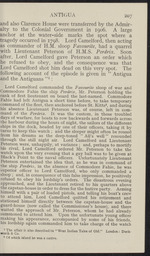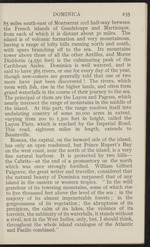| 1 |
 |
“...the Perdrix. It was the custom, in those troubled
days of warfare, for boats to row backwards and forwards across
the harbour during the hours of night, the sailors of the different
ships in the dock, headed by one of their officers, taking it by
turns to keep this watch ; and the sleeper might often be roused
from his dreams as the deep-toned " All's well" resounded
through the still night air. Lord Camelford and Lieutenant
Peterson were, unhappily, at variance ; and, perhaps to mortify
his rival, Lord Camelford ordered Mr. Peterson to take the
watch upon the very evening that a gay ball was to be given at
Black’s Point to the naval officers. Unfortunately Lieutenant
Peterson entertained the idea that, as he was in command of
the ship Perdrix, in the absence of Commodore Fahie, he was
superior officer to Lord Camelford, who only commanded a
sloop ; and, in consequence of this false impression, he positively
refused to obey his lordship's orders. The disastrous evening
approached, and the...”
|
|
| 2 |
 |
“...Palgrave, the great writer and traveller, considered that
the natural beauty of Dominica surpassed that of any
island in the eastern or western tropics. " In the wild
grandeur of its towering mountains, some of which rise
to five thousand feet above the level of the sea ; in the
majesty of its almost impenetrable forests; in the
gorgeousness of its vegetation; the abruptness of its
precipices, the calm of its lakes, the violence of its
torrents, the sublimity of its waterfalls, it stands without
a rival, not in the West Indies, only, but, I should think,
throughout the whole island catalogue of the Atlantic
and Pacific combined.”...”
|
|
| 3 |
 |
“...362 POCKET GUIDE TO THE WEST INDIES
The blacks, infuriated, renewed the struggle under General
Dessalines. In 1803, on the approach of an English fleet, the
French agreed to evacuate the island, and in 1804 independence
was declared, and the aboriginal name of Haiti revived. Des-
salines was made Governor for life, but later in the year he
proclaimed himself Emperor. He was assassinated in 1806, and
two rival chiefs, Cristophe and Pétion, established themselves
in the north and south respectively; while the Spaniards took
the eastern portion óf the island, which they called Santo
Domingo. Pétion died in 1818, and, Cristophe having committed
suicide in 1820, General Boyer became master of the whole of
the western end of the island, and in 1822, taking advantage of
dissension in the Spanish part, he invaded it and captured the
whole of it. The entire island was then called Haiti, but in
1843 Boyer was driven out by a revolution, and in 1844 the
people in the eastern part established the Dominican...”
|
|
